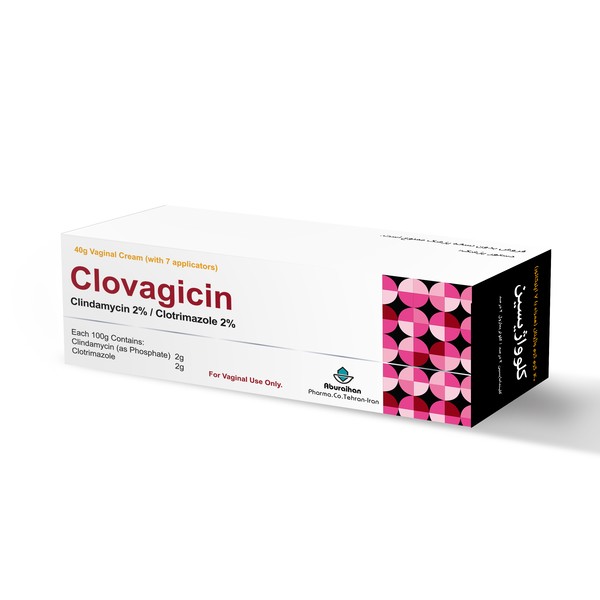Clovagicin®
Clindamycin/Clotrimazole
Vaginal cream 2%
Clindamycin phosphate which is an antibiotic, is used in the treatment of bacterial vaginosis (a bacterial infection of the vagina).
Clotrimazol is used to treat a fungal infection in the vagina and vulval area (thrush).
Mechanism of Action:
Clindamycin works primarily by binding to the 50s ribosomal subunit of bacteria. This agent disrupts protein synthesis by interfering with the transpeptidation reaction, which thereby inhibits early chain elongation.
Clotrimazole exerts its action primarily by damaging the permeability barrier in the fungal cytoplasmic membrane.
Method of Administration:
Always use this medicine exactly as your doctor or pharmacist has told you. The usual dose is one applicator full (approx 5 grams), which should be placed into the vagina each night at bedtime for seven consecutive nights. Your doctor may recommend a shorter, three-day course of treatment depending on your symptoms.
Wash your hands thoroughly before handling the cream or using the applicator. To avoid the possibility of re-infection, strict personal hygiene must be observed. The cream should preferably be inserted in the evening, just before bed time, with the use of an applicator. Using it before you go to sleep will have the best effect. Use a new applicator for each nightly dose. If you miss a dose, continue with the next dose as soon as you remember, or the next evening.
Loading an applicator
- Wash your hands thoroughly.
- Open the Clovagicin cream tube. Attach the applicator to the tube and hold it firmly pressed against the tube. Squeeze the cream tube until the applicator is full.
3.Inserting the applicator Carefully insert the end of the applicator containing the cream as gently and deeply into the vagina as possible. This is best achieved when lying on your back with your knees bent. Hold the applicator in position and slowly push the plunger with the forefinger until it stops.
Notes
Contraindications:
Do not use Clovagicin Vaginal Cream:
- If you are allergic (hypersensitive) to clindamycin, clotrimazole or to any of the other ingredient of this medicine
- If you suffer with a history of inflammatory bowel disease or antibiotic-associated colitis.
Interactions:
Talk to your doctor or pharmacist if you are taking erythromycin, lincomycin (or any other antibiotics), Warfarin or are taking, have recently taken or might take any other medicines, including medicines obtained without a prescription.
Pregnancy and Lactation:
If you are pregnant, think you may be pregnant or are planning to have a baby, ask your doctor or pharmacist for advice before using this medicine.
It is not known whether the active ingredient, clotrimazole and clindamycin are excreted in breast milk. Your doctor will be able to discuss with you the risks and benefits involved with treatment.
Warning and Precaution:
Before you start to use Clovagicin cream, consult your doctor if:
- This is your first infection
- You are under 18 years of age
- You have had 3 or more infections in the last 6 months
- You have allergies to any other topical treatments
- If you are pregnant. You should see your doctor if you suspect you have thrush in the first three months of your pregnancy. Your doctor can discuss with you the risks and benefits involved with treatment.
- If you are breast-feeding.
- If you are diabetic. Thrush in diabetics can mean that your blood sugar levels are not well controlled. Your doctor will be able to check this for you and advise treatment.
- If you have diarrhea or usually get diarrhea when you take antibiotics. If you develop severe, prolonged or bloody diarrhea during or after using Cream tell your doctor immediately since it may be necessary to interrupt the treatment.
- As with all vaginal infections, sexual intercourse during treatment with Clovagicin Cream is not recommended. Clovagicin Cream may weaken condoms and diaphragms. Do not rely on condoms or contraceptive diaphragms when using this medicine. The use of other vaginal products such as tampons or douches (vaginal washes) during treatment with the cream is not recommended.
Adverse Reactions:
Like all medicines, this medicine can cause side effects, although not everybody gets them. Tell your doctor immediately if you:
- Develop severe, persistent or bloody diarrhea (which may be associated with stomach pain or fever). This is an uncommon side effect which may occur after treatment with antibiotics and can be a sign of serious bowel inflammation
- Experience an allergic reaction or skin reaction such as hives or a measles-like rash. These are very rare side effects.
Very Common side effects (Incidence>10%)
Inflammation of the Cervix
Common side effects, (Incidence<10%)
Vaginal thrush, Infection or inflammation of the vulva and vagina, Itching, vaginal discharge, Stomach cramps
Storage:
Store below 30 and protect from light and moisture.

